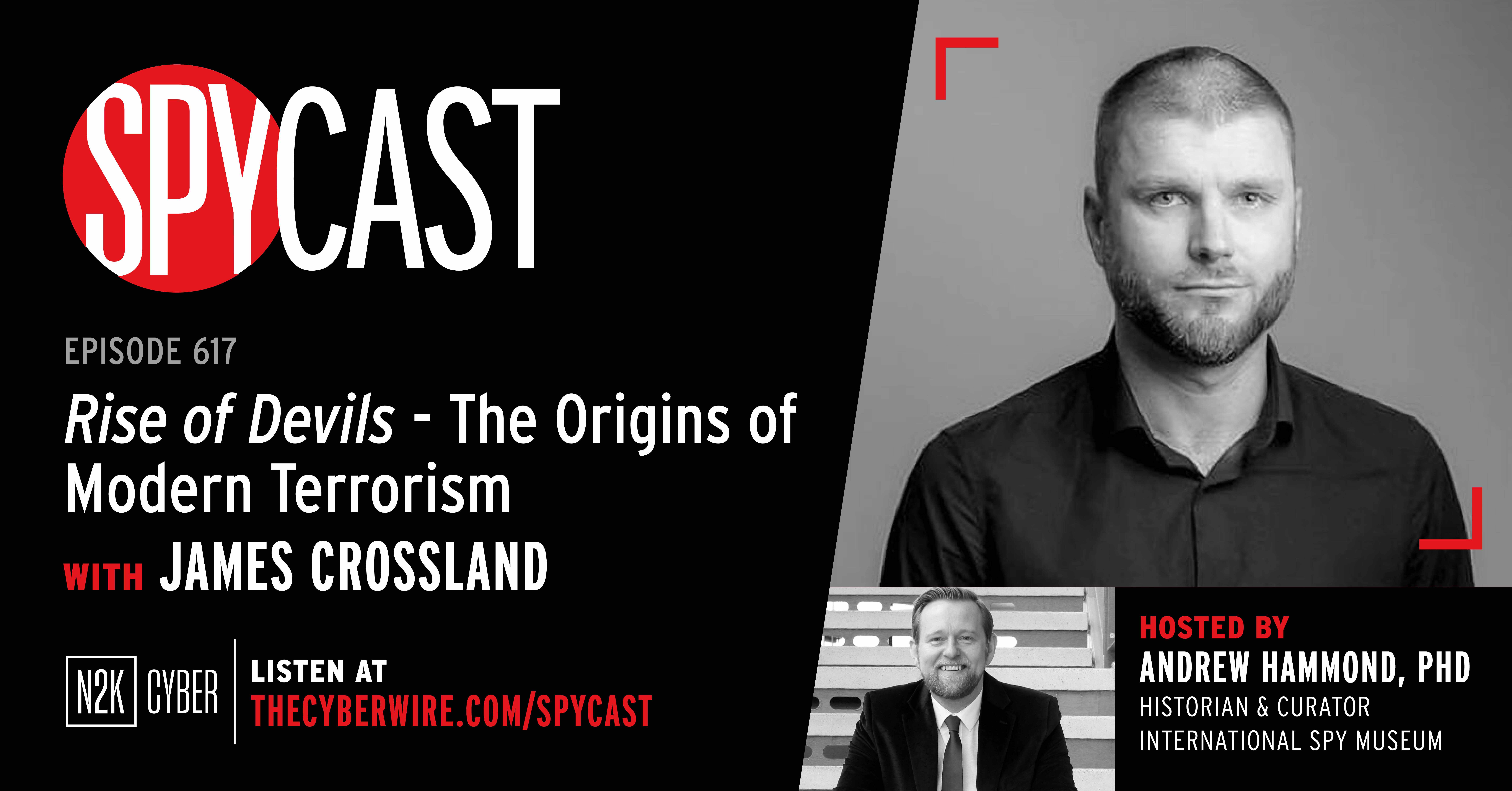
Rise of Devils: The Origins of Modern Terrorism with James Crossland
Summary
James Crossland (Twitter) joins Andrew (Twitter; LinkedIn) to discuss the origins of modern terrorism. James is an expert on terrorism, intelligence, and propaganda.
What You’ll Learn
Intelligence
- The origins of modern terrorism
- 19th century spymasters
- Covert action and assassinations
- Intelligence as a weapon
Reflections
- Philosophy and ideology’s effect on history
- The power of fear
And much, much more …
Episode Notes
This week on SpyCast Andrew was joined by James Crossland, author of the new book The Rise of Devils: Fear and the Origins of Modern Terrorism. James is a Professor of International History and the Co-Director of Liverpool John Moores University’s Centre for Modern and Contemporary History. He has authored five books, including an upcoming exploration of Sir Robert Bruce Lockhart, the wartime head of the clandestine propaganda organization, the Political Warfare Executive.
In this episode, James and Andrew discuss the origins of modern terrorism through the events of the so-called “Long 19th Century,” including numerous assassinations and the rises of Marxism, nihilism, and anarchism. 19th century Europe was a tumultuous time of revolutionary thought and violent action. How did this era directly engender the World Wars of the next century, and what role did intelligence play in the chaos that was ensued by the rise of terrorism? Tune in to find out.
And…
100 years after the late 19th century events discussed in this episode, a new form of anarchical expression arose: Punk Rock. Emerging largely out of New York and London, the punk subculture focused on the ideas of non-conformity and anti-authoritarianism, all with a sharp spiky-haired and leather jacket-wearing fashion edge. After listening to this episode, turn on some tunes from The Clash, the Ramones, or the Sex Pistols.
Quotes of the Week
“These waves of repression that feed into discontent and create more radical strains of discontent, that is a process that's really observable during this period. The reason why I think this is the first real age of terrorism is because you have all this stuff coming together: Communications that you need to promote terrorist activities to gain the attention you need, societal discontent, dangerous ideas … and it's all moving around together as part of the same process.” – James Crossland.
Resources
SURFACE SKIM
*Spotlight Resource*
- The Rise of Devils: Fear and the Origins of Modern Terrorism, J. Crossland (Manchester University Press, 2023)
*SpyCasts*
- Venice’s Secret Service with Ioanna Iordanou (2023)
- St. Ermin’s Hotel, London – The History of a Legendary Spy Site, with Stephen Duffy (2023)
- Espionage and the Two Queens with Kent Tiernan (2023)
- The Lion and the Fox – Civil War Spy vs. Spy with Alexander Rose (2023)
*Beginner Resources*
- Terrorism, J. P. Jenkins, Encyclopaedia Brittanica (2023) [Short article / definition]
- What Were The Most Important Events of the 19th Century?, C. Seaver, History Defined (2022) [Short article]
- Marxism in Under 5 Minutes, Theory in 5, YouTube (2020) [3 min. video]
DEEPER DIVE
Books
- Sofia Perovskaya, Terrorist Princess: The Plot to Kill Tsar Alexander II and the Woman Who Led It, R. R. Riggs (Global Harmony Press Inc., 2018)
- The Pursuit of Power: Europe 1815-1914, R. J. Evans (Penguin Books, 2017)
- Blood and Rage: A Cultural History of Terrorism, M. Burleigh (Harper, 2009)
Articles
- The History of the Pinkerton Detective Agency: America’s Premier Private Detectives, J. Brown, History Defined (2023)
- On the terrifying hoax execution that haunted Dostoevsky’s writing, W. Caplan, Lit Hub (2022)
- Fenianism and the Martyrdom-Terrorism Nexus in Ireland before Independence, G. Beiner, Martyrdom and Terrorism: Pre-Modern to Contemporary Perspectives (2014)
- Okhrana: The Paris Operations of the Russian Imperial Police, B. B. Fischer, History Staff Center for the Study of Intelligence (1997)
- Violence and Terror in Russian Revolutionary Populism: the Narodnaya Volya, 1879–83, A. von Borcke, Social Protest, Violence and Terror in Nineteenth- and Twentieth-century Europe (1982)
- Protocols of the Elders of Zion, United States Holocaust Memorial Museum (n.d.)
Audio
- Terror Through Time: Napoleon and the Birth of Terror, BBC Radio 4 (2013)
Primary Sources
- The assassination, who is responsible? (1901)
- New York Times “Empress of Austria Slain” Article (1898)
- New York Times “War On Terrorism” Article (1881)
- La vérité sur Orsini (1872) [The Truth about Orsini]
- Manifesto of the Paris Commune (1871)
- The Revolutionary Catechism (1869)
- On the Fenian Prisoners in Manchester (1867)
- Procès de Orsini (1858) [The Trial of Orsini]
*Wildcard Resource*
- You may have already read his classic play Crime and Punishment, but have you read Dostoevsky’s The Idiot (1869)?
- This novel is known as Dostoevsky’s most personal work, a story that clearly shows the threads of his own life experiences during 19th century Russia. The novel explores many of the same questions of philosophy and politics explored in this episode of SpyCast.


